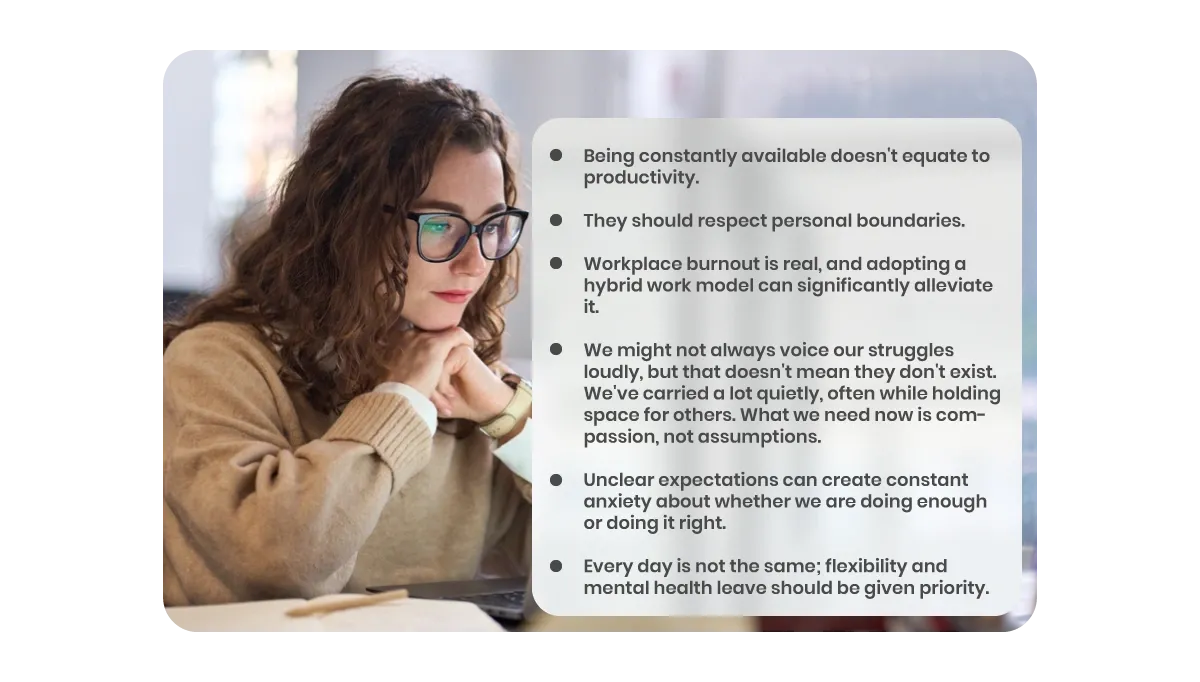Why Millennial Employees Are Facing a Mental Health Crisis (And How to Help Them)
Did you know? By the end of 2025, millennials are expected to represent 75 percent of the global workforce. Who belongs to the millennial generation? Individuals born between 1981 and 1996, also known as Generation Y, are considered millennials.
Word is 33 percent of millennials reported that their job plays a major role in their stress levels. This highlights the urgency of addressing mental health among millennials. It is a crucial situation for employers, especially when Generation Y is set to become the largest working demographic soon.
Since this generation is going to be the majority in the global workforce, their well-being is no longer a personal issue. Their well-being holds a bigger stake in the business world, too. The work quality of millennials will be the key factor in shaping work productivity, culture, and probability.
Addressing the mental health needs of millennials is crucial for businesses to grow and flourish in the long term. How can business leaders address millennials' mental health problems correctly?
Here's what a fellow millennial corporate employee has to say:
One thing I wish employers truly understood about mental health is that it's not just about workload or burnout from long hours. It's also about the lack of open, grounded conversations around mental well-being. Often, mental health is only addressed when it's tied to performance or stress, but it goes much deeper.
This statement is simply a cry for help coming from a millennial employee. Another study cites 51 percent of millennials battling with one mental health condition, while 29 percent of Generation X (the previous generation) reported mental health problems.
As someone from this generation, I understand these challenges deeply. So, in this blog, I will be sharing insights on how millennials are coping with mental health struggles at work. Discover here-
-
The struggles and triumphs of millennials in the workplace
-
What they want their employers to do regarding mental health care
-
Strategies for leaders to implement ASAP
The Alarming Statistics: What The Data Reveals About Millennial Mental Health
A recent anonymous workplace survey revealed the following statistic:
-
30 percent of millennials reported feeling anxious before logging in or going to work.
-
65 percent of millennials reported feeling emotionally exhausted at work in the last six months.
-
44 percent of the respondents reported feeling stuck between unrealistic expectations and poor systems at work.
Below are some more numbers that highlight the crucial state of this particular age group:
-
As per a Deloitte report, 47 percent of millennials say that their longer-term financial future contributes a lot to their feelings of anxiety and stress.
-
Another study cites that millennials are known to experience higher anxiety, depression, and stress in comparison to older generations.
-
In the United States, one of the top mental health conditions affecting millennials was major depression, according to a study.
Understanding The Millennial Mental Health Crisis

Unlike previous generations, millennials grew up watching their elders, belonging to baby boomers or Gen X, navigate life with mental health concerns often sidelined. They prioritized financial stability and "toughed it out." Many millennials saw firsthand how their previous generations faced financial struggles and had limited access to mental health services.
Seeing the hardships, millennials consciously seek a different path. They are more likely to approach life's challenges by aiming to secure both their mental and emotional well-being alongside financial goals. This marks a striking generational shift.
This shift doesn't mean millennials experience less stress. On the contrary, they grew up in times of economic pressure, rapid technological change, and the lingering effects of crises such as the Great Recession and the pandemic. All these factors led this generation to adapt quickly to changes in technology, culture, and even mindset.
We were raised before technology ruled our lives. We had to adapt quickly to the change. Conversations around mental health were rare and often dismissed. So, we had to teach ourselves how to cope, heal, and grow.
In short, understanding the millennial mental health crisis requires recognizing both the external pressures they face and this deep-rooted generational evolution: from "just cope" to "cope well and thrive."
This perspective is crucial for organizations aiming to build resilient, engaged, and healthy teams for millennials. For them, true success means thriving both mentally and financially.
Breaking The Stigma: Why Millennials Still Don't Speak Up
As per the in-house survey that I conducted, 64 percent of the respondents suggested taking mental health leave without having to explain the reason, which will likely support their mental health at work. 24 percent of them said, "If I told my manager I was struggling mentally, they would see me as weak or unreliable."
Here's what another respondent had to say:
Most millennials usually stay silent when it comes to mental health and avoid taking leave because of morals and responsibilities. Employers should acknowledge this and take steps to prevent burnout and facilitate a culture of mental health support.
The above illustrates the reluctance of millennials to open up even at work. The good news is that companies are encouraging employees to have more open conversations about mental health. The challenging part is that most millennials continue to feel hesitant about discussing their struggles at work.
The ingrained notion that strength equates to silent endurance has been passed down through previous generations. Combined with their ongoing stress about workplace politics and potential career setbacks, millennials prefer to keep quiet about their mental health needs in professional settings.
The Paradox of Millennial Mental Health Openness
Millennials actively seek open and grounded conversations about mental health. They advocate for workplaces where emotional safety is valued and respected. Yet, a section of them struggle to speak up for themselves (given the deep-rooted notion that mental health is secondary).
Another crisis that millennials face is peer judgment from within their own generation and younger generations, such as Gen Z and Gen Alpha. Did you know? The Wall Street Journal labeled those born between 1981 and 1996 as "the therapy generation." Even then, most millennials face backlash when they are willing to talk about mental health issues.
This further causes them to shut down. Moreover, a report suggests that younger generations criticize millennials for being too open about their feelings. These dynamics highlight the need to break the stigma and cultivate a workplace culture where mental well-being issues are addressed strategically.
What Do Millennials Actually Want from Employers?
What millennials want from their employers is a million-dollar question. Here are some statements from fellow millennial employers that every employer should know:

6 Promising Strategies to Support the Mental Health of Millennials
Millennials have metamorphosed into individuals who suffer in silence. They want to be vocal, but they have been conditioned to keep mum when it comes to talking about mental health. And even if they share a bit of their troubles, guilt kicks in. If not, other millennials may shush them out.
The modern workplace requires a strategic, multi-layered approach to address the mental health challenges of millennials. Millennials may be hesitant to share their struggles openly. Hence, introducing third-party workplace counsellors is one of the many initiatives that employers can try.
Let's explore additional strategies that can support millennial mental health.
Immediate Actions
1. Normalize mental health discussions at all levels
Creating a safe space to openly share about mental health troubles is the need of the hour. Workplaces should also address the stigma surrounding mental health. For this, management must go beyond surface-level discussions. Hosting workshops are how leaders can begin the groundwork. They should also address the "millennial cringe" phenomenon and therapy-speak misuse that creates shame among peers.
Although this is something that will take a lot of time to bring change in everyone's mindset. One has to begin the work; only then will the results follow in the near future.
2. Easy access to mental health resources
Most workplaces are slowly starting to offer mental health resources, but they are not readily available. These resources usually include access to therapy, anonymous mental health check-ins, and guided meditation sessions. Most wellness platforms that offer such resources are available at an undesirable price.
Partnering with wellness platforms like Vantage Fit, which offer such perks at a discounted price or even for free, will be a great way to support millennials' mental health status.
3. Offer mental health day-offs
Apart from the regular leaves, organizations should introduce a policy of a mental health day off. It is one of the simplest and most effective ways an organization can subtly convey, "We care about your mental health." Encourage employees to use them whenever needed, without needing to explain their reason.
Offer paid or free access to mental health professionals in the workplace or even off-site.
Long-Term Strategies
4. Train leaders to identify and address peer judgment dynamics
Training leadership to address mental health effectively is critical in supporting millennials. According to an in-house survey, respondents suggested that managers should receive sensitivity training and mandatory mental health training.
Tackling this generation's mental health issues requires managers to be able to identify the depth of the situation. Only then can they guide and support the employees properly.
Additionally, managers should get a briefing about the reality of how peers negatively influence millennials' mental health. They should learn how to destigmatize the topic at all levels.
5. Foster a Culture Where Mental Health is Part of Regular Workplace Metrics
Commonly, organizations consider physical wellness metrics as a standard to set a benchmark while planning to achieve employee well-being. Additionally, incorporating mental health metrics into the regular workplace wellness standard is a key way for organizations to foster a wholesome culture for millennials.
6. Regularly Review Company Practices for Hidden Barriers
Periodic evaluation helps detect faults in the ongoing strategies and prevents "well-being washing." For this, organizations must consider KPIs like absenteeism, happiness index, employee well-being index, and engagement rates.
Conduct anonymous surveys before and after trying out strategies to get the proper results. To get proper insights, conduct the surveys after trying a strategy for at least 3 to 6 months.
Act Now: Prioritize Millennials' Mental Health for Success
Prioritizing mental health is crucial for a workplace to transcend. It is also a business imperative as millennials continue to shape the future of work. Employers who will prioritize mental health will see improved employee satisfaction. With that, they will also drive long-term business success.
Are you ready to make a meaningful impact on your organization’s approach to millennial mental health? Because it’s time to take action. Take the first step today; talk to one of our experts and create a mental health-friendly workplace.
Frequently Asked Questions
1. How do millennials view mental health?
The majority of millennials highly prioritize mental health. This generation is popularly known as the "therapy generation" for their openness and indulgence towards mental health therapy.
2. Which generation struggles the most with mental health?
The young people belonging to Generation Z are known to struggle most with mental health. They are popularly known as the "Anxious Generation."
3. How do millennials view the mental health support provided by their employers?
Most millennials believe their employers have a significant area for improvement in terms of mental health support at work. While some say they are receiving a fair amount of mental health support from their managers and even colleagues.
4. What workplace factors contribute most to millennial mental health issues?
-
Financial insecurity
-
High workload or unclear expectations
-
Lack of work hour flexibility
-
Perceived stigma or lack of managerial support
-
Limited career progression opportunities
-
Lack of mental health support
5. What are the signs that a millennial employee may be struggling with mental health?
-
Increased absenteeism
-
Decreased performance or disengagement at work
-
Withdrawal from colleagues or workplace activities
-
Behavioral health issues like irritability, mood swings, or changes in demeanor
-
Open or subtle signals of stress, anxiety, or burnout
-
Indulgence in substance abuse, such as alcohol and drug use.







